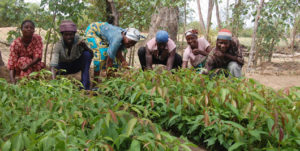More female farmers venture into male-dominated crop production areas
 Many female farmers have ventured into production of crops often seen as ‘men crops’, following an aggressive capacity building efforts undertaken by African Lead, to improve leadership skills of women into agribusiness across the country.
Many female farmers have ventured into production of crops often seen as ‘men crops’, following an aggressive capacity building efforts undertaken by African Lead, to improve leadership skills of women into agribusiness across the country.
More than 200 women involved in Ghana’s agriculture transformation process aiming to combat hunger and improve food security have benefited directly from the Africa Lead champions for change leadership short courses since 2010.
“I have gone through a lot of training, especially change for champions where a lot of different models have been introduced,” Hajia Alima Sagito Saed, Executive Director of Savannah Integrated Rural Development, said.
“One of the key successes stories that we have learned or been able to impact to our women is to get their confidence to build and venture into otherwise men crops,” she told the Ghana News Agency at a Super Champions for Change Women’s Conference in Accra.
Over 100 women across the country took part in the two-day confab where members of the Women in Agribusiness Network of Ghana (WIANG) engaged in networking, learning and information sharing sessions on opportunities and new technologies in agribusiness.
Maize, yams, cassava, sorghum, millet, cocoa, beans, palm oil, pineapples, cotton, tomatoes and plantain production are considered in several Ghanaian communities as ‘men crops’ due to the tedious nature of their cultivation or physical energy exerted in tilling land.
“When soya beans came the men were more into it than women, the idea is that it is tedious to do soya beans but with the capacity and leadership training, women now understand you can do farming without using only your physical energy and still get the results, Hajia Saed said.
She described leadership as “leading strategically” which is crucial in everything women involved in agricultural transformation agenda, and expressed the belief that scaling up capacity training efforts in rural farming communities would boost food production significantly.
“Currently we have about 120 women group scattered in the Northern Region and each one has a maximum of 30 people,” she said, “so you can imagine that we reach so many women every year.”
“What we are doing is to target the leadership of these groups, build their confidence in such a way that they can be empowered to produce along the agriculture value chain – so they will not see themselves working in isolation.”
“That the issue of working as a group, as a team, and networking with others to get results. All these impacts are what we have been able to get to our leaders [women] and for that matter that is what they are using now to venture into otherwise men dominated crops. We even have instances where we have some women who are now farming yams.”
“Yam too is the crop that men are leading in the production but gradually we have women that have raised yams and own yam farms, they now harvest and get the crops, go and sell and also have the cash.”
The women in the Northern Region have also established and operate their own ‘village savings and loans’ facility and community social fund where they draw money to pay their children school fees and learning materials as well as access healthcare services.
“Every time there is this challenge of lack of credit for farming, lack of credit for farming, we have seen this as a challenge for long, but it is not going, it means that we just have to find a way of going around it.”
“So what we have done strategically is to form village savings and loans facility, the process is for the women to internally generate their own money and invest in their own capacity to transform their businesses.”
The Super Champion Women, though lauded the capacity building efforts, they called for introduction of robust agricultural policies that would favour females into agribusinesses.
The enabling farming environment – whereinimical traditional and cultural practices inhibiting farming are removed, women can access better credit facilities, secure lands and receive consistent training in farm modernization –would enable them to inject dynamism in Ghana’s agriculture to boost production andensure food security.
“What women farmers need urgently is for food and agriculture ministry to come out with inclusive agricultural policies and programmes that will favour our women to showcase their new learning skills and technologies,” Mrs Helena Azu-Adjei, WIANG Coordinator, said.
“I have had so many training programmes organised by Africa Lead, through them, we have been able to seek for funds to celebrate women annually [successful women achievers].”
During such events, she policy makers were invited to talk on favourable agriculture policies to favour women after which farm inputs like cutlasses, wheelbarrows, hoes and wellington boots distributed to the women, but added “the talk is not enough what we need is policy and action plan.”
Mr Azu-Adjei, who is also the Gender Desk Officer of Farmers Organisation Network in Ghana, said with the support of Africa Lead several women Bowohonmoden in the Brong Ahafo Region have been trained women on food security, the comprehensive African agricultural development programme [CAADP] principles and women involvement in decision making.
Source: GNA
